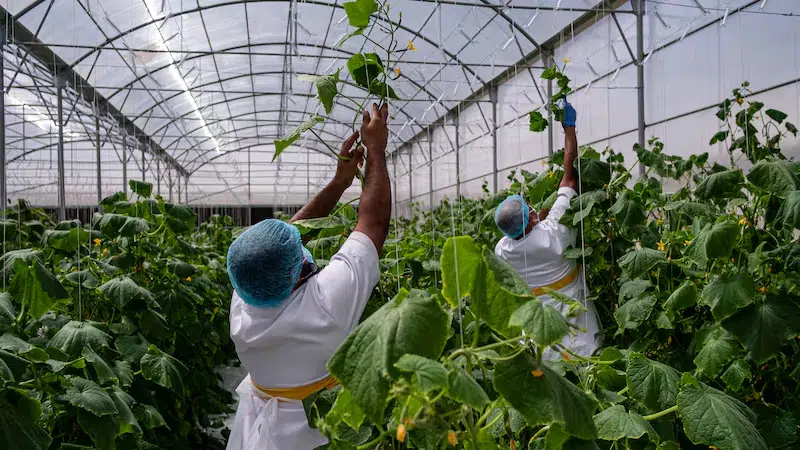Dubai’s approach to prisoner rehabilitation is breaking new ground with an innovative program that transforms convicted inmates into skilled agricultural workers. More than 300 prisoners from Dubai Central Jail have participated in the Hasad Project, a pioneering Dubai inmates rehabilitation initiative launched last year that combines sustainability, education, and social reintegration through farming.
The Hasad Project: Growing More Than Crops
The name “Hasad” — Arabic for “harvest” — perfectly encapsulates the mission of this ambitious project: to harvest new skills, hope, and purpose in the lives of inmates through hands-on farming. Located on a vast 9,600-square-meter farm in Al Awir, the project has rapidly expanded from a modest 224-square-meter plot and now features 14 climate-controlled greenhouses, fields, and a classroom designed to provide comprehensive agricultural training.
Under the guidance of Lt. Col. Mohammed Al Obeidli, Director of the Inmate Education and Training Department at Dubai Police, the project is more than a typical prison farm — it is a state-of-the-art operation integrating sustainable farming techniques aimed at conserving water and reducing carbon emissions.
“Inmates learn to cultivate a variety of crops using climate-smart techniques that conserve water and reduce carbon emissions,” said Lt. Col. Al Obeidli. “Our goal is not only to teach farming but to prepare inmates to use these skills to reintegrate into society successfully.”
Impressive Yields and Real Impact
Since its inception, the Hasad farm has produced remarkable yields, including 294 kilograms of hot peppers, 1.5 tonnes of capsicum, 15 tonnes of tomatoes, and 67 tonnes of cucumbers. These high-quality crops generate around Dh900,000 ($245,030), which is reinvested into other rehabilitation and educational programs within Dubai’s correctional facilities.
A sustainable financial model ensures that 2% of the revenue maintains the farm’s operations, while the remainder is saved to support inmates who leave prison and want to start agricultural projects such as farms or shops selling agricultural supplies.
Life-Changing Experiences Behind Bars
For many inmates, the Hasad Project has become a beacon of hope and a pathway to a productive future. One inmate serving nine years for bribery and forgery shared how the program has transformed his outlook:
“I never thought I’d find purpose again. Working with my hands and learning about sustainable agriculture has changed my mindset. When I leave, I want to start a farm of my own.”
Another inmate serving 15 years for murder described how farming gave him hope and a renewed sense of self-worth:
“Growing plants and harvesting crops has changed my mentality. I’m a new person now. I regret my past mistakes, but this project gives me faith I can return to society as a productive individual.”
Rehabilitation Through Sustainable Agriculture
The Hasad Project is part of a broader shift in Dubai’s correctional philosophy—moving from punishment alone to rehabilitation through skill-building and sustainable initiatives. The integration of modern farming technology is central to this mission. Sensors in greenhouses regulate temperature, while computerized systems monitor nutrient delivery, providing inmates with experience that aligns with modern agricultural careers.
The project’s curriculum includes training in plant disease management, seed extraction, irrigation techniques, and farm business management, equipping inmates with practical knowledge to pursue employment or entrepreneurship after release.
Supporting UAE’s Food Security and Sustainability Goals
The Hasad Project aligns with the UAE government’s Plant the Emirates strategy, which aims to strengthen local agriculture and food security while promoting sustainability. Dubai Police’s innovative rehabilitation farm contributes directly to these national goals, creating a unique model that blends social responsibility with environmental stewardship.
Lt. Col. Al Obeidli highlighted the synergy:
“By merging innovation, sustainability, and social responsibility, Dubai Police are leading the way in redefining rehabilitation. The Hasad Project not only helps inmates but also supports the country’s commitment to food security and environmental conservation.”
Future Plans and Expansion
Building on its initial success, the Hasad Project plans to expand its crop variety, including introducing okra and zucchini, and further upgrading technology to enhance yields and efficiency. Formal certification programs are also being developed to validate the agricultural skills inmates acquire, increasing their employment prospects.
Collaborations with food companies and hypermarkets ensure that produce harvested from the farm supplies local markets and restaurants, turning the prison farm into a thriving social enterprise.
Conclusion
Dubai’s inmates rehabilitation efforts through the Hasad Project demonstrate how innovative prison programs can create positive social change. By empowering inmates with sustainable farming skills, the project fosters personal growth, reduces recidivism, and supports UAE’s broader environmental and food security goals.
The success of the Hasad Project sets a new benchmark in correctional rehabilitation worldwide — sowing seeds of hope and cultivating brighter futures for those seeking a second chance.
About Dubai Police
Dubai Police is a progressive law enforcement agency committed to innovation, community development, and public safety. Initiatives like the Hasad Project underscore Dubai Police’s dedication to pioneering rehabilitation programs that support inmates’ reintegration and promote sustainability.
www.yallatv.ae





